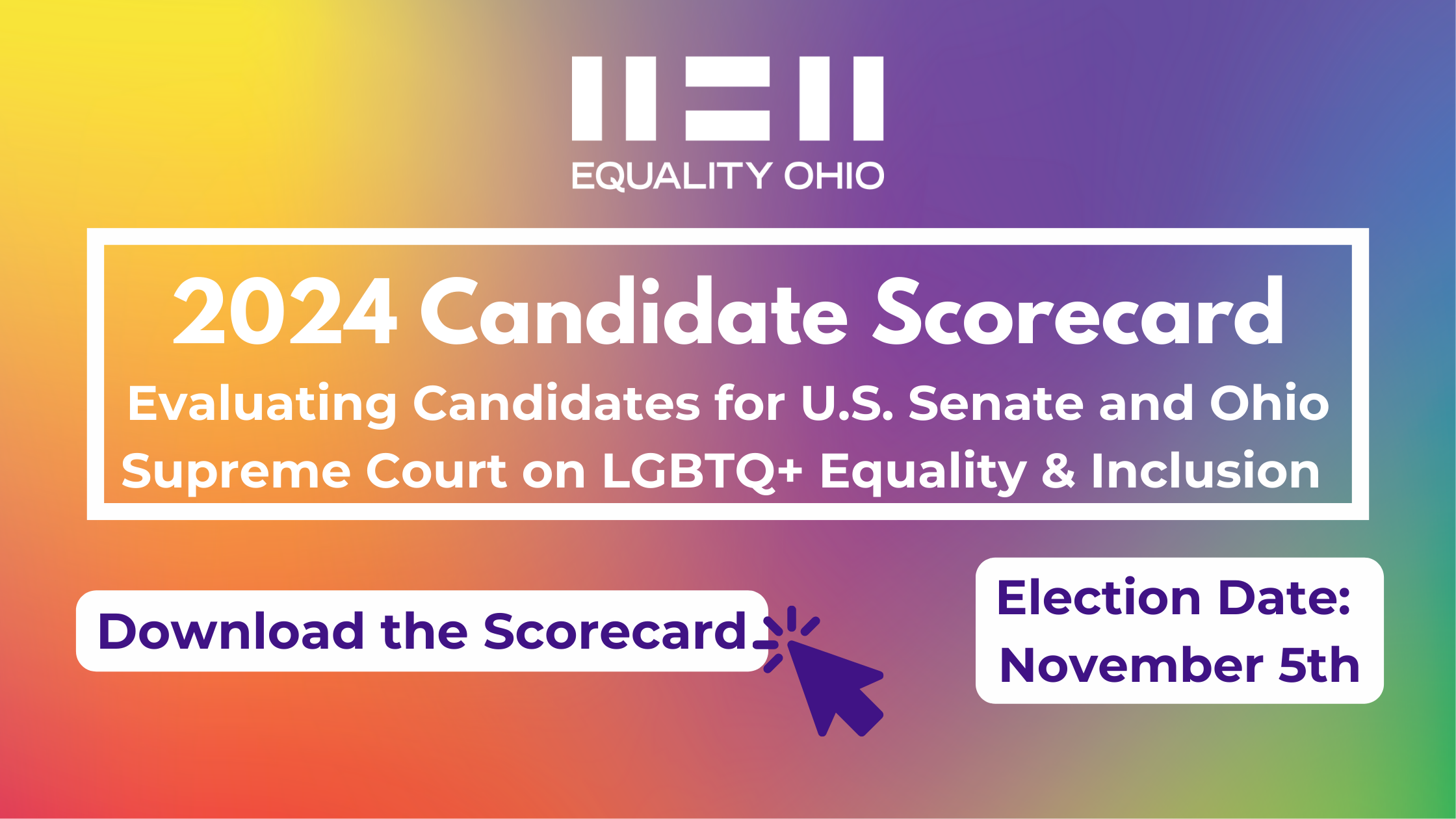How Scoring Statewide Candidates Works | For executive office candidates, unlike the General Assembly scores, we graded candidates on the totality of their career track records, including accomplishments, public statements, and campaign platforms, and we took into account both improvements or backsliding over time.
What We Looked For in Statewide Candidates | Character | Competency | Support for Civil Rights Promises and Accomplishments Related to Diversity, Equity & Inclusion | Commitment to Transparency & Ethics
How to Interpret Letter Grades:
A | Strong record & promising future in office
B | Mostly strong record or insufficient record but supportive campaign platform
C | Mixed record or insufficient record & unclear campaign platform
D | Mostly poor record or insufficient record but concerning campaign platform
F | Poor record & likely to harm civil rights in office
United States Senate (term starting January 3, 2025)

Sherrod Brown, a U.S. Senator for Ohio since 2007, champions Ohioans’ rights against special interests. He advocates for affordable healthcare, higher wages, job creation, and social justice.
Sherrod Brown, a U.S. Senator for Ohio since 2007, champions Ohioans’ rights against special interests. He advocates for affordable healthcare, higher wages, job creation, and social justice. Known for his bipartisan efforts, Brown prioritizes working families over partisan politics. He sponsors and supports legislation to protect constitutional rights and democratic values, and actively supports the LGBTQ+ community. Brown consistently advocates for addressing systemic injustices, reflecting these values in his voting record.
WEBSITE: Sherrod Brown, the incumbent and Senior United States Senator from Ohio serving since 2007, is running for re-election. He is a particularly strong champion of Ohio workers, consistently advocating for affordable healthcare, higher wages, job creation, social justice, and standing up to special interests. Senator Brown has built a reputation for bipartisan collaboration, notably working with Republican Senators Rob Portman and J.D. Vance, prioritizing good public service and the well-being of his constituents over partisan politics.
Senator Brown was born in Mansfield, OH, earned a Bachelor of Arts degree in Russian Studies from Yale University, and a Master of Arts in Education degree and Master of Public Administration degree from The Ohio State University.
Brown touts extensive experience in government, beginning his political career as a member of the Ohio House of Representatives (1975 – 1983). Senator Brown then served as the Secretary of State of Ohio (1983 – 1991) and as a U.S. congressman for Ohio’s 13th district (1993 – 2007) before becoming a U.S. Senator in 2007.
Brown’s opposition to the Defense of Marriage Act marked an early stance for LGBTQ+ rights. He has remained a vocal ally, supporting policies ensuring equal treatment in housing and the workplace for the LGBTQ+ community. He is also a sponsor of the Equality Act, further underscoring his ongoing dedication to civil rights and protecting vulnerable communities.
Brown has a strong record in other areas as well. Brown voted against the Patriot Act which violates sacred civil liberties, supported the CHIPS Act to bring manufacturing jobs to Ohio, supported the Affordable Care Act (ACA) to improve access to affordable healthcare, and the Butch Lewis Act to protect pensions. A notable highlight of his Senate career includes his role in passing the Dodd-Frank Wall Street Reform and Consumer Protection Act, aimed at preventing the recurrence of the 2008 financial crisis. However, he has faced criticism from some quarters for his staunch opposition to certain free trade agreements.
In recent legislative efforts, Senator Brown has pushed for restoring the Voting Rights Act, increasing aid to veterans and small businesses, combatting the fentanyl crisis, and extending high-speed internet and electricity to rural Ohio.
Senator Sherrod Brown received an A for his extensive record demonstrating his values and maintaining his stances on key issues such as workers’ rights, healthcare, and social justice.
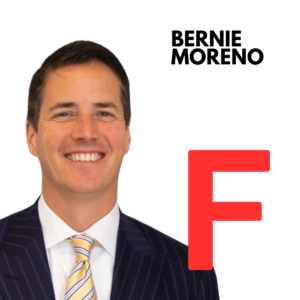
Bernie Moreno, the Republican candidate for the U.S. Senate, has no prior voting record or political office experience, so voters will have to rely on his short-lived time as a public figure to make their decisions.
Bernie Moreno, the Republican candidate for the U.S. Senate, comes from a background of managing car dealerships and auto sales. Moreno is a self-proclaimed political outsider inspired to enter politics due to his disapproval of pandemic public health policies. He has no prior voting record or political office experience, so voters will have to rely on his short-lived time as a public figure to make their decisions.
Born in Colombia, Moreno became an American citizen at 18. He attended the University of Michigan, where he earned a Bachelor of Arts degree in Business Administration. Moreno purchased his first car dealership in 2005 and later expanded his business ventures by investing in blockchain technology.
Moreno’s campaign centers on populist rhetoric such as shrinking government and prioritizing “America First” principles. Some of his stated priorities include challenging “Communist China”, defending the Second Amendment, promoting free market principles, supporting a ban on abortion services, and opposing socialism and “wokeness.”
While Moreno previously publicly supported LGBTQ+ rights as a business owner, including his dealership sponsoring the 2014 Gay Games and expressing support for the Equality Act, his recent campaign rhetoric is markedly different. He now describes LGBTQ+ justice as part of a “radical agenda” and criticizes opponents for supporting equality and safety for trans individuals.
Moreno’s about-face on LGBTQ+ issues and dangerous rhetoric on other important issues raise concerns about the policy positions he will support if elected. His demonstrated tendency to abandon the interests of his constituents to curry political favor and praise from key conservative organizations and public figures. He has received endorsements from politicians including Donald Trump, JD Vance, and Ted Cruz, and he’s been endorsed by organizations such as Ohio Right to Life and Moms for America Action (an extremist organization that endorsed the January 6th riots), among others. Moreno receives an F for his perpetuation of harmful rhetoric, drastic shifts on critical LGBTQ+ rights, and lack of experience.
Ohio Supreme Court Scoring
How Scoring Works | For Judicial candidates, we used slightly different criteria than the rest of Ohio’s elected offices. Along with respect for civil rights and general ethics, we looked for independence from partisan politics and consistency in judicial philosophy. Like the other statewide offices, we graded candidates on the totality of their career track records, including accomplishments, public statements, and campaign platforms, and we took into account both improvements or backsliding over time.
What We Looked For in Judicial Candidates | Character | Competency | Consistency in Judicial Philosophy | Respect for Civil Rights | Commitment to Transparency & Judicial Ethics | Judicial Independence from Partisan Politics
What’s At Stake | The Ohio Supreme Court is the top arbiter of Ohio’s state constitution and laws. Each is elected to a 6-year term. The state’s highest Court is an important check on the other branches of government.
Why It Matters | Two million cases go through our state court system yearly, and the Ohio Supreme Court will hear around 1,500 of them. Whether it’s ruling that the school funding formula is unconstitutional, or sending gerrymandered maps back to the Ohio Redistricting Commission, these seven Justices decide the fate of Ohio’s most consequential legal disputes.
Impact on LGBTQ+ Rights | The Ohio Supreme Court may hear cases that involve LGBTQ+ issues, litigants, and civil rights. It is important that we elect Justices who understand LGBTQ+ people, support LGBTQ+ equality, and are willing to uphold LGBTQ+ civil rights.
Types of Disputes the Ohio Supreme Court Decides:
-
The constitutionality of laws passed at the state and local level
-
Cases involving election disputes and redistricting
-
Questions of public or great general interest
-
Death penalty and other felony cases
-
Administrative agency appeals
How to Interpret Letter Grades:
A | Strong record & promising future in office
B | Mostly strong record or insufficient record but supportive campaign platform
C | Mixed record or insufficient record & unclear campaign platform
D | Mostly poor record or insufficient record but concerning campaign platform
F | Poor record & likely to harm civil rights in office
Ohio Supreme Court Seat 1 Candidates
(term starting January 1, 2025)
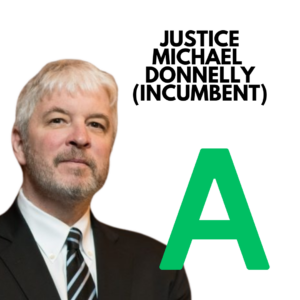
Michael Donnelly, a Democrat, is running for re-election to the Ohio Supreme Court. He has a comprehensive legal background and is committed to improving transparency and fairness in the judicial system.
Justice Michael Donnelly is running for re-election to his current seat on the Ohio Supreme Court, which he has held since 2019. His campaign focuses on maintaining judicial integrity, enhancing transparency, and protecting the rights of Ohioans.
Justice Donnelly graduated from John Carroll University and earned his J.D. at Cleveland State University’s Marshall College of Law. His legal career began as an assistant Cuyahoga County Prosecutor (1992 – 1997) before moving into private practice as an attorney at the firm of Davis & Young (1997 – 1999). He later joined the firm Climaco, Lefkowitz, Peca, Wilcox & Garofoli representing injured workers and plaintiffs in asbestos litigation, personal injury lawsuits, and workers’ compensation claims (1999 – 2004) before being elected as a judge of the Cuyahoga County Common Pleas Court (2005 – 2018). He later became one of five judges on the county’s Mental Health and Developmental Disabilities Court.
On the Ohio Supreme Court, Justice Donnelly has been influential in rejecting gerrymandered legislative and congressional districts, emphasizing the need for fair representation in line with Ohio’s Constitution. He opposed the General Assembly’s power to schedule a special August election in 2023 and defended the Reproductive Freedom Amendment’s place on the 2023 ballot. Also while serving on the Supreme Court of Ohio, he ruled against First Energy, helping roll back over $200 million in consumer surcharges .
Justice Donnelly emphasizes the importance of creating transparency in the plea bargain process and ensuring the right to fair and speedy trials. He has condemned systemic delays in the trial process and pushed for a comprehensive effort to collect criminal sentencing data to address disparities in sentencing and improve public perception of the judicial system. His extensive legal experience, commitment to improving transparency and fairness in the judicial system, and demonstrated values collectively earn him an A.
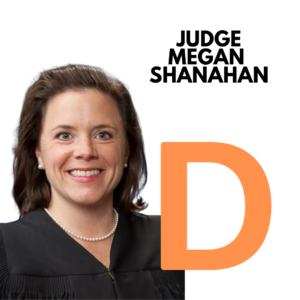
Judge Shanahan’s close political affiliations with the Federalist Society raise concerns about partisanship and extremism. She has publicly aligned herself with and touts endorsements from anti-bodily autonomy and anti-LGBTQ+ organizations.
Judge Megan Shanahan is a Hamilton County Common Pleas Judge, where she has served since 2015. Judge Shanahan brings considerable legal experience to the table, including having served as a prosecutor in both Butler and Hamilton Counties.
Judge Shanahan’s legal career began as an assistant prosecutor for Butler County where she served in the municipal, appellate, and trial divisions. She moved to the Hamilton County Prosecutor’s Office in 2005. She also served as a prosecutor for Mount Healthy Mayor’s Court. In 2011, she was elected to the Hamilton County Municipal Court and was appointed to the Hamilton County Court of Common Pleas in 2015 by Governor John Kasich. She holds a Bachelor of Arts in political science from Kent State University and a Juris Doctor from the University of Cincinnati.
Judge Shanahan has a mixed judicial record. Her background includes successful prosecution in over 50 jury trials, with a particular focus on advocating for child victims and their families. Shanahan’s tenure as a prosecutor and work with crime victims led to her receiving the Peggy Caldwell Award for her dedication.
Judge Shanahan’s Originalist arguments against basic judicial oversight have prompted questions about her willingness to interpret the law in a fair and nuanced manner. One of her rulings, in favor of allowing a Cincinnati police officer to anonymously sue people who accused him of being racist under a pseudonym, raises concerns about her judicial philosophy.
Judge Shanahan’s close political affiliations with the Federalist Society raise concerns about partisanship and extremism. She has publicly aligned herself with and touts endorsements from anti-bodily autonomy and anti-LGBTQ+ organizations. Due to a mostly poor record and significant concerns about biases, she has earned a D score.
Ohio Supreme Court Seat 2 Candidates
(term starting January 1, 2025)
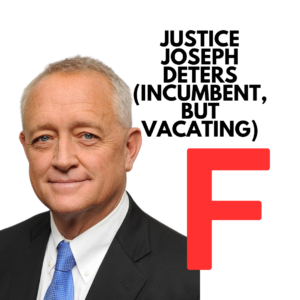
Justice Joe Deters has a history of harmful rhetoric that has drawn criticism from the public in several higher profile cases.
Justice Joseph Deters has been a Supreme Court Justice since 2023, having been appointed by Governor Dewine to fill the vacant seat left by Chief Justice Kennedy following the 2022 election. Rather than serving the remainder of his term ending in 2026, he is choosing to run against his colleague on the bench and the first ever African American woman elected to statewide office, Justice Melody Stewart, for her seat.
Justice Deters earned a Bachelor of Science in Administration from the University of Cincinnati, and his Juris Doctor from the University of Cincinnati College of Law.
His legal career began as an Assistant Hamilton County Prosecutor (1982 -1988), after which he served as Hamilton County’s Clerk of Courts before returning to the Hamilton County Prosecutor’s office as a Prosecuting attorney (1992 – 1999). Justice Deters then became Ohio’s Treasurer of State, but resigned in 2004 after he was exposed for a pay-to-play scandal involving his former chief of staff. Justice Deters was elected to his former position as Hamilton County Prosecutor (2005-2023), a position he held until being appointed to the Ohio Supreme Court by Governor DeWine in 2023.
Despite his own legal scandals, Justice Deters has maintained a tough-on-crime disposition, including when he continued to seek the death penalty even after the state paused executions as a prosecutor. As a proponent of the death penalty, Justice Deters has even suggested a return to firing squads for executions, indicating he believed the practice to be constitutional. He has a history of harmful rhetoric that has drawn criticism from the public in several higher profile cases. Furthermore, Justice Deters has vocally supported prosecuting violations of abortion laws indicating a high likelihood of ruling in favor of cases restricting reproductive justice if elected.
Justice Deters identifies as an Originalist, arguing that laws should be interpreted based on their meaning at the time the laws in question were enacted This judicial philosophy is frequently used by extremists to justify ruling against equality and fundamental civil rights. He condemns judicial activism from the bench, though his record shows clear and pervasive conservative biases that are cause for concern.
Justice Deters was the driving force behind the recent bail reform efforts in Ohio, a campaign ultimately resulting in bail policies that disproportionately impacted the poor and other marginalized groups. He has repeatedly ruled in favor of unconstitutional legislative maps, disregarding clear democratic principles while serving on the Ohio Supreme Court.
While Justice Deters has extensive legal experience, his judicial philosophy, public statements, and prior rulings raise serious concerns about his impartiality and fitness for the state’s highest court, earning him an F.
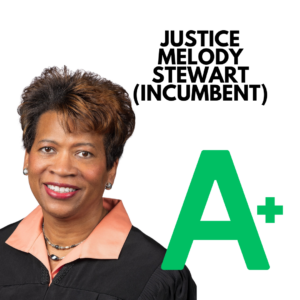
While serving on the Supreme Court of Ohio, Justice Melody Stewart consistently rules to uphold Ohioans’ constitutional rights and preserve democratic values.
Justice Melody Stewart is running for re-election to the Ohio Supreme Court, where she has served since 2018. She is the first African American woman elected to the Ohio Supreme Court and any statewide office in Ohio. Justice Stewart is a staunch advocate for judicial independence and has condemned the requirement to include party affiliations for justices on the ballot. She has consistently emphasized the importance of ruling based on law rather than party identity and has stated she does not exclusively subscribe to any judicial philosophy, underscoring her commitment to impartiality and avoiding predetermined outcomes in her rulings.
Justice Stewart earned a bachelor’s degree in music from the University of Cincinnati’s College-Conservatory of Music, a law degree from Cleveland State University’s College of Law, and a Ph.D from Case Western Reserve University’s Jack, Joseph, and Morton Mandel School of Applied Social Sciences.
Justice Stewart brings extensive experience and perspective to the bench, with her professional journey beginning as a civil defense attorney in Cleveland (1988 -1990). She also has a background in academia, serving as an assistant Dean and adjunct instructor, and later as a full-time faculty member at CSU Law (1989 – 1998). Justice Stewart also held faculty positions at the University of Toledo College of Law (1998 – 1999) and Case Western Reserve University (2000 – 2003). Justice Stweart won a judicial appointment to serve on the 8th District Court of Appeals in 2006, and she was re-elected to the seat in 2010 and 2016.
While serving on the Supreme Court of Ohio, Justice Stewart consistently rules to uphold Ohioans’ constitutional rights and preserve democratic values. Authoring the majority opinion directing the Ohio Redistricting Commission to redraw legislative maps highlights her commitment to upholding constitutional principles and ensuring fair representation and participation in our democratic processes. Her notable track record of advocating for transparency, nonpartisanship, and accountability in the judicial process, as well as respecting precedent, further solidifies her reputation as a principled and visionary jurist.
Justice Melody Stewart’s exceptional educational background, distinguished legal and judicial career, numerous awards and recognitions, commitment to impartiality, extensive community involvement, strong endorsements, and notable judicial actions, collectively earn her an A+ rating.
Ohio Supreme Court Seat 2 Candidates
(term starting January 1, 2025)

Judge Lisa Forbes stresses the importance of the judiciary as an equal branch of government and has stated she opposes legislating from the bench, stressing the importance of judicial impartiality.
Judge Lisa Forbes is a Judge on Ohio’s 8th District Court of Appeals, where she has served since 2020.
A first-generation college graduate, Judge Forbes attended Cornell University and Case Western Reserve University School of Law. Alongside her legal experience, Judge Forbes has worked in Congress and on political campaigns. Her legal career began after clerking for a U.S. district court judge, the Honorable Frank J. Battisi (1992 – 1993), and practicing as an associate business litigator at Squire, Sanders & Demsey LLP (1993 – 1997). She was also an associate litigator and later, partner, at Vorys, Sater, Seymour, and Pease LLP (1997 – 2020) before being elected as a judge.
In her judicial philosophy, Judge Forbes has stated she begins with the text of the law, considers the circumstances, and aims to clarify ambiguities, emphasizing her understanding of the importance of stability and consistency in the law, but not limiting her interpretation to one approach. In her campaign for the Ohio Supreme Court, Judge Forbes emphasizes the State Supreme Court’s role as a defender of democracy, and her statements indicate a desire to restore public trust in the justice system. She focuses on public safety, opposing corruption, and protecting constitutional rights. She stresses the importance of the judiciary as an equal branch of government and has stated she opposes legislating from the bench, stressing the importance of judicial impartiality.
Judge Forbes does not have a lengthy record of judicial rulings to interpret, however, her expressed judicial approach, extensive litigation experience and reputation for being a principled attorney, and her explicit commitment to upholding justice and protecting Ohioans’ constitutional rights, earn her an A-.

Judge Dan Hawkins has extensive legal experience, but some aspects of his judicial record and public statements are cause for concern, as they suggest a higher likelihood of ruling against LGBTQ+ rights and other important democratic safeguards in future cases.
Judge Dan Hawkins is a Common Pleas Judge in Franklin County, a role he has held since 2019. He has extensive legal experience, but some aspects of his judicial record and public statements are cause for concern, as they suggest a higher likelihood of ruling against LGBTQ+ rights and other important democratic safeguards in future cases.
Prior to sitting on the Franklin County Common Pleas Court, Judge Hawkins served as Assistant Prosecuting Attorney and Director of the Special Victims Unit for the Franklin County Prosecutor’s Office (2001 – 2013), and as Judge of the Franklin County Municipal Court Environmental Division (2013 – 2019). Judge Hawkins earned a Bachelor of Science in Criminal Justice from Bowling Green State University and a J.D. from The Ohio State University College of Law.
Judge Hawkins’ vocal support of bail policies that disproportionately harm the poor is cause for serious pause, and his membership in the Federalist Society suggests a higher propensity for ruling with partisan bias. Judge Hawkins has, however, indicated a desire to utilize judicial restraint and not gratuitously undermine civil rights and protections. Further, his long record of holding office in a diverse county including the city of Columbus, suggests he is capable and willing to be a moderating voice rather than a zealot from the bench.
Judge Hawkins’ mixed record and questionable political affiliations earn him a C-.
Statewide Ballot Initiative:
Citizens Not Politicians Amendment
The proposed ballot initiative aims to overhaul the way legislative districts are drawn in Ohio. Instead of allowing politicians and party operatives to control the process, it would establish an independent commission composed of 15 Ohio citizens. These citizens would be selected based on specific criteria designed to ensure their impartiality, including a prohibition on current elected officials or lobbyists serving on the commission.
By placing the responsibility for drawing legislative districts in the hands of a diverse group of citizens rather than self-interested politicians, the initiative seeks to promote fairness and accountability in Ohio’s electoral system. Proponents argue that this approach is essential for ensuring that all voters have equal representation and that the electoral process remains free from undue influence. Unpopular legislation, such as much of the anti-LGBTQ+ legislation proposed in Ohio, would have a much lower chance of becoming law if our electoral district boundaries were constitutional, and representative of the diverse state.
Gerrymandering, the practice of manipulating electoral district boundaries to favor one political party or group over another, has become a significant issue in American politics. When politicians are allowed to draw their own legislative districts, they often do so in a way that prioritizes their own party’s interests, leading to skewed representation and unfair outcomes. This process has been linked to the rise of extremist legislation and divisive rhetoric, as politicians in safe districts cater more to their base than to the broader interests of their constituents.
In Ohio, this problem has reached a critical point, with the Ohio Supreme Court ruling that the current legislative maps are unconstitutional due to partisan gerrymandering. In response, citizen activists have mobilized to address the issue directly through a ballot initiative scheduled for 2024.
Ultimately, the goal of the ballot initiative is to combat gerrymandering and promote proportional representation in Ohio’s democracy. By empowering citizens to play a direct role in shaping electoral boundaries, the initiative represents a crucial step toward creating a more equitable and democratic political system. Equality Ohio urges support for this initiative.
Additional Nonpartisan Voter Resources
- Visit Vote411.org to get a full list of the races and issues on your ballot this year.
- If you have questions about voting rights or have difficulty casting your ballot, call the nonpartisan election protection hotline, 1-866-OUR-VOTE (1-866-687-8683)

